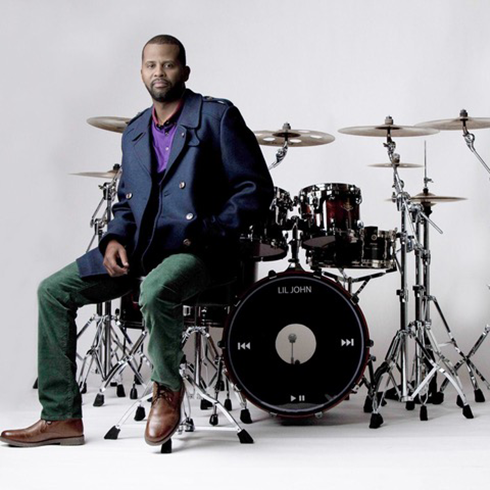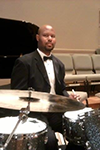by
Rhythm Scene Staff
| Jul 20, 2020

I had the opportunity recently to speak with Lil John Roberts, an in-demand drum set artist, writer, and producer. He’s worked with Janet Jackson, Michael Jackson, George Duke, George Howard, George Benson, Prince, Sheila E, Stevie Wonder, Seal, DJ Jazzy Jeff and The Fresh Prince (Will Smith), Neyo, Jonathan Butler, Boney James, Musiq Soulchild, Jill Scott, Raphael Saadiq, and the list goes on. In our conversation, Roberts gives some practical “nuggets” and words of wisdom for aspiring musicians.
Teddy Hall: How did you obtain the gigs with major artists with whom you have had the opportunity to perform in live venues and on tour?
Lil John Roberts: I must say it is a combination of skills and talent, as well as being connected in the right circles and knowing the right people. Of course, though, you have to be able to keep up with the demand of the position. It starts with dedication on your instrument (or voice) and practice, practice, practice, as well as preparation either by yourself or working with other people to help get your skill set up to par. Furthermore, playing or singing at those gigs that aren't considered "big" helps because by taking those gigs, you go through the motions as if you were on the “big stage.”
TH: Please discuss the type of preparation needed for an aspiring drummer who's studying percussion in college and desires to pursue a career as a touring musician.
LJR: Preparation is the biggest part for being ready for a situation that might come to you. For me, practicing with a metronome or prerecorded tracks was key for me to be ready for the challenge of playing Janet Jackson’s music live. You’ve got to be near perfect playing those patterns and grooves, and even more, it has to "feel" good for her and the dancers to dance to! So, I always say feel over fills! Don't get caught up into playing fills or chops more than concentrating on the groove or the feel of the songs. The feel is the most important thing that someone like Janet Jackson is looking for.
TH: Since you are very versatile, what do you do personally to be in a position where you can perform with multiple musicians in various musical genres?
LJR: I take pride in learning all types and genres of music, whether it be gospel, rock, jazz, R&B, blues, hip-hop, reggae, country, Latin, Brazilian, African, or whatever! Knowing how to play different styles will always keep you working. Don't ever box yourself into one style of music, because one day you might get a call to play something out of that box, and what will you do then? Learn as many genres as possible, even if it’s just enough to pull it off if you are ever asked to play it.
TH: As it relates to recording and being a studio musician, what skill sets are necessary to receive those opportunities?
LJR: Studio work is another art in itself. There are things you could possibly “get away with” playing live; however, you probably won't be able to get away with them when you’re recording. I always say "treat your live performance like you are being recorded for a live album," which means making sure everything is “sitting right” while you are performing. Cross every “t” and dot every “i.” Make sure your bass drum and snare drum are lined up with the click and prerecorded tracks (if you're using them), because in the studio you cannot hide mistakes; it’s all in your face when you listen back to the performance! You have to be very precise or it will sound like a mess. Also, it has to feel good with everything else (bass, keys, guitar, etc.) unless you or the producer don’t really care much about the flaws in the track. When you're working with top producers like Quincy Jones, George Duke, or Greg Phillinganes, they are looking for the best performance from whomever is recording the track, and if it’s not happening, you might get replaced by someone who is capable of bringing the magic to the track. Also, drum tuning is essential for the most effective performance on a record. Take the time to tune the drums to fit the song. Some songs require higher tuning for snare drums and toms, while other songs may require lower, fatter snare drum sounds as well as muffled toms. Other considerations might include bass drum tuning variations and cymbal selections.
John “Lil’ John” Roberts is a highly sought-after drummer who thrives in the industry as the ultimate heartbeat. John, a native of Philadelphia, quickly became noted as a child prodigy playing alongside Christian McBride and Joey Defranceso at age 16. The trio was part of the Duke Ellington Orchestra, a project created and directed by Wynton Marsalis, and was comprised of the country’s 22 best young jazz musicians. Under full scholarship at Berklee College of Music in Boston, Massachusetts in 1991, John studied for two years and started his touring career with hip-hop artists DJ Jazzy Jeff and the Fresh Prince (Will Smith). From there, he moved to Atlanta, Georgia, where he started recording and touring with Dionne Farris, Xscape, Monica, The Goodie MOB, and Joi. At the request to fill in for Jonathan Moffet, John began touring with Janet Jackson at age 23 and continued to tour with her for two decades. Having toured and recorded numerous records with George Howard, he was sought after in the contemporary jazz circuits by the great George Duke and began working with Duke and Rachelle Ferrell, and others like George Benson, Patti Austin, James Ingram, Bob Baldwin, Boney James, Erik Essix, Everette Harp, Gabriela Anders, Gerald Albright, Herbie Hancock, Kirk Whalum, Jeff Lorber, Jonathan Butler, Najee, Peter White, Rachelle Ferrelle, and Rick Braun. John recorded and co-produced Walter Beasley’s album Going Home. For more information, visit liljohnroberts.com.
 Teddy Hall, Jr. is an active performer, educator, and clinician. He received a Master of Music in Music Education degree from the University of Mississippi and a Bachelor of Science in Music Education degree from the University of Alabama-Birmingham. Hall’s teaching experiences include serving as Instructor of Music (percussion) at Alabama State University, Hampton University, Tennessee State University, Alabama A&M University, and Stillman College. Hall has presented percussion clinics at the AL PAS Day of Percussion, Virginia/DC PAS Day of Percussion, University of Mississippi, Mississippi State University, Amro Music, Memphis Drum Shop, and Florida A&M University. He has served as a percussion adjudicator at various marching band festivals, honor band festivals, and all-state festivals in Alabama, Mississippi, and Tennessee. Aside from his teaching experience, Hall has vast and diverse playing experience serving as a freelance musician with such groups as the Cobb Wind Symphony, Montgomery Symphony Orchestra, UAB Community Winds, West Side Winds, Atlanta Music Project, and the Tuscaloosa Big Band. As a PAS member, Hall served as the Treasurer for the Alabama PAS Chapter and currently serves as a member of the PAS University Pedagogy Committee and Diversity Committee.
Teddy Hall, Jr. is an active performer, educator, and clinician. He received a Master of Music in Music Education degree from the University of Mississippi and a Bachelor of Science in Music Education degree from the University of Alabama-Birmingham. Hall’s teaching experiences include serving as Instructor of Music (percussion) at Alabama State University, Hampton University, Tennessee State University, Alabama A&M University, and Stillman College. Hall has presented percussion clinics at the AL PAS Day of Percussion, Virginia/DC PAS Day of Percussion, University of Mississippi, Mississippi State University, Amro Music, Memphis Drum Shop, and Florida A&M University. He has served as a percussion adjudicator at various marching band festivals, honor band festivals, and all-state festivals in Alabama, Mississippi, and Tennessee. Aside from his teaching experience, Hall has vast and diverse playing experience serving as a freelance musician with such groups as the Cobb Wind Symphony, Montgomery Symphony Orchestra, UAB Community Winds, West Side Winds, Atlanta Music Project, and the Tuscaloosa Big Band. As a PAS member, Hall served as the Treasurer for the Alabama PAS Chapter and currently serves as a member of the PAS University Pedagogy Committee and Diversity Committee.